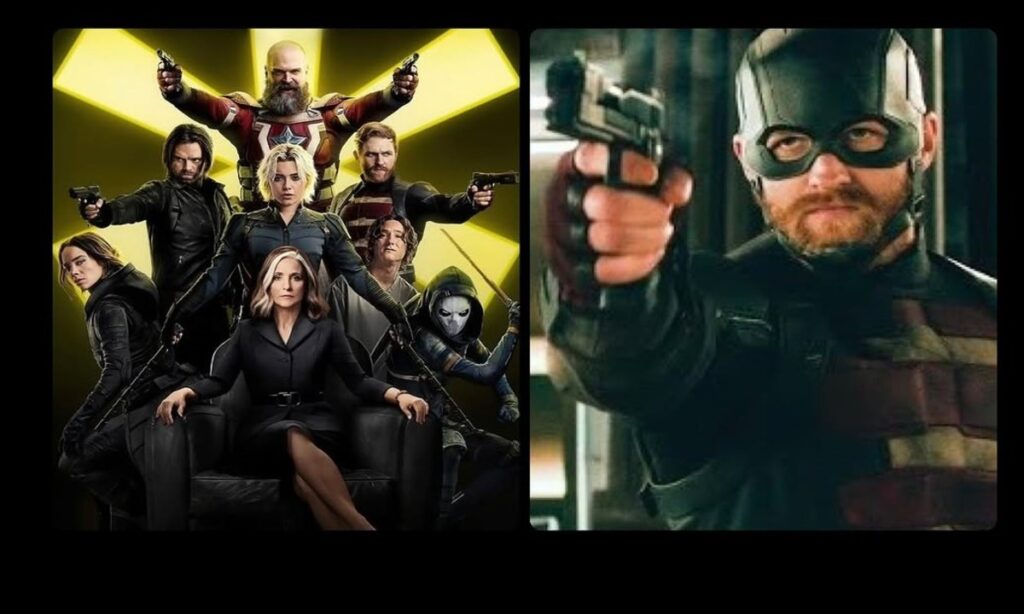In the ever-expanding Marvel Universe, few characters embody the conflict between patriotism and personal morality quite like John Walker, better known as U.S. Agent. Introduced as a bold alternative to Captain America, Walker’s story is one of ambition, manipulation, and internal struggle. With superhuman strength and a sense of duty to his country, he is both a hero and a cautionary tale—a man trying to do the right thing in all the wrong ways. As the MCU brings this complex character into the spotlight, fans are now seeing a darker side of heroism unfold.
Certainly! Here’s a full detailed explanation of U.S. Agent, one of the more morally complex characters in the Marvel Universe, both in comics and the Marvel Cinematic Universe (MCU).
🇺🇸 Who is U.S. Agent?
Real Name: John Walker
Alias: U.S. Agent
Formerly known as: Super-Patriot
ORIGIN (Comics)
First Appearance:
- Captain America #323 (1986)
- Created by: Mark Gruenwald (writer) and Paul Neary (artist)
Backstory:
- John Walker was born in Custer’s Grove, Georgia, and grew up idolizing his older brother, a soldier who died in the Vietnam War.
- Wanting to follow in his brother’s footsteps, John joins the military but feels he never lives up to his brother’s legacy.
- Seeking more purpose, he becomes a super-powered patriotic hero called Super-Patriot, positioning himself as a modern alternative to Captain America.
Powers and Abilities
John Walker was granted powers by the Power Broker, a criminal scientist who enhances humans for profit. His abilities include:
- Superhuman Strength – Slightly stronger than Steve Rogers
- Enhanced Agility & Reflexes
- Accelerated Healing
- Combat Training – Military-grade skills
- Expert in Shield Combat – Learns to use a shield similar to Cap’s
However, unlike Steve Rogers, John lacks the same emotional control, moral compass, and leadership qualities.
Becoming Captain America
- When Steve Rogers becomes disillusioned with the U.S. government and gives up the mantle of Captain America, the government appoints John Walker as the new Cap.
- At first, Walker tries to follow in Steve’s footsteps, but:
- He is more aggressive, brutal, and struggles to uphold the ideals that Captain America represents.
- His tenure includes violent outbursts, killing enemies, and psychological trauma after his parents are murdered.
Eventually, Steve Rogers returns, and the government offers John Walker a new identity: U.S. Agent.
As U.S. Agent
- John Walker now acts as a black-ops version of Captain America—someone who does the dirty work the public doesn’t see.
- He wears a red, white, and black suit and carries a vibranium shield (not the original).
- He’s often portrayed as a “dark mirror” to Steve Rogers: patriotic, but with questionable morals and an unstable temperament.
- He has served on several teams:
- West Coast Avengers
- Thunderbolts
- Dark Avengers
- Force Works
U.S. Agent in the MCU
Played by: Wyatt Russell
MCU Debut:
- The Falcon and the Winter Soldier (Disney+, 2021)
Plot Summary:
- After Steve Rogers retires, the U.S. government chooses John Walker as the new Captain America.
- Initially confident and proud, Walker’s mental state declines due to:
- Pressure of living up to Steve’s legacy
- Public criticism
- Traumatic events in combat
- He later takes a homemade Super Soldier Serum, which enhances his strength but worsens his violent tendencies.
- After publicly killing a Flag Smasher with Cap’s shield, he is stripped of the Captain America title.
- At the end of the series, he is recruited by Valentina Allegra de Fontaine and given the new identity: U.S. Agent.
Character Traits & Morality
- Patriotic but flawed – deeply loyal to his country, but lacks restraint.
- Emotionally unstable – struggles with rage, PTSD, and ego.
- Morally gray – operates in the space between hero and antihero.
- Often used as a tool by governments or covert organizations.
Role in the Future MCU
- Set to appear in Thunderbolts* (2025).
- Likely plays the role of the “blunt instrument” or enforcer within the team.
- Could be manipulated, used as a weapon, or even turn against the team depending on how he’s written.
Summary
| Attribute | U.S. Agent (John Walker) |
|---|---|
| Alignment | Antihero / Morally gray |
| Powers | Super soldier strength, stamina, and reflexes |
| Key Traits | Brutal, patriotic, emotionally volatile |
| First Appearance | Captain America #323 (1986, Comics) |
| MCU Debut | The Falcon and the Winter Soldier (2021) |
| Future Appearance | Thunderbolts (2025) |
Thunderbolts* writer Eric Pearson said that the team was originally facing a different villain: “There are a couple of versions where part of Valentina’s manipulation of them, for John Walker, she convinced him that his Super Soldier Serum was deteriorating and he needed updates, he needed to have monthly shots. What she was actually doing was implanting a ‘Hulk Bomb’ or I think she even called them ‘A Bomb,’ which is a very obscure character from the comics. But if she needed to create an event, she could set him off, so he would rage out into this big monster. It was fine, but it didn’t work the same.”
Certainly! Here’s a full detailed breakdown of what Thunderbolts writer Eric Pearson revealed about an earlier version of the movie’s plot, specifically regarding the original villain concept and the manipulation of the team—especially John Walker (U.S. Agent):
Original Villain & Plot Concept in Thunderbolts
Valentina’s Manipulation Plan
In one of the earlier versions of the script for Thunderbolts, Valentina Allegra de Fontaine (played by Julia Louis-Dreyfus), who serves as a Nick Fury-type manipulator in the MCU’s darker corner, had a more sinister and complex plan involving John Walker, aka U.S. Agent.
Key Points:
- Valentina tells John Walker that his Super Soldier Serum—which he got during The Falcon and the Winter Soldier—is deteriorating.
- She convinces him that to maintain his powers and avoid health problems, he needs to receive monthly “update” injections.
- Walker trusts her, believing that these injections are helping him stabilize his serum.
The Real Agenda: Planting a Hulk Bomb
- What Valentina is actually doing, behind the scenes, is implanting a hidden explosive biological trigger inside Walker.
- This trigger is a type of “Hulk Bomb”.
- It’s a secret weapon designed to forcefully transform Walker into a rampaging monster—similar to the Hulk.
- In some versions of the script, Valentina even refers to this as an “A-Bomb”, a direct nod to the Marvel Comics character “A-Bomb”.
Comic Book Reference: Who is A-Bomb?
- A-Bomb is a lesser-known character in Marvel Comics.
- Real name: Rick Jones, a longtime friend of the Hulk.
- After being exposed to gamma radiation, Rick mutates into a blue-skinned, armored Hulk-like creature, codenamed A-Bomb.
- He possesses superhuman strength, durability, and can even turn invisible under certain conditions.
- In the comics, A-Bomb is not a villain, but the idea of using that name implies a monstrous transformation triggered at will, just like a bomb being detonated.
Why Was This Idea Dropped?
Eric Pearson said this version was “fine,” but it ultimately “didn’t work the same.”
Possible reasons:
- Too complex or distracting for the overall team narrative.
- Might have made John Walker more of a pawn than a proactive antihero.
- Didn’t resonate tonally or thematically with the rest of the story.
- Perhaps it pulled too far into sci-fi horror, while the studio wanted a more grounded psychological conflict.
Summary
- The Thunderbolts team was originally going to face a different internal threat—John Walker unknowingly being turned into a gamma-powered monster.
- Valentina was behind this, manipulating him under false pretenses.
- The term “Hulk Bomb” or “A-Bomb” referenced a forced Hulk-like transformation as a strategic weapon.
- This plotline was eventually cut for not fitting well with the rest of the movie’s tone and structure.
John Walker’s transformation into U.S. Agent highlights the grey areas within heroism and power. Unlike Steve Rogers, Walker doesn’t always make the right choices—but it’s this moral complexity that makes him so compelling. As the MCU continues to explore darker and more grounded stories, U.S. Agent stands out as a symbol of how ideals can be weaponized—and how redemption, though difficult, is never out of reach. Whether he becomes a true hero or a dangerous wildcard, one thing is certain: U.S. Agent’s journey is far from over.

